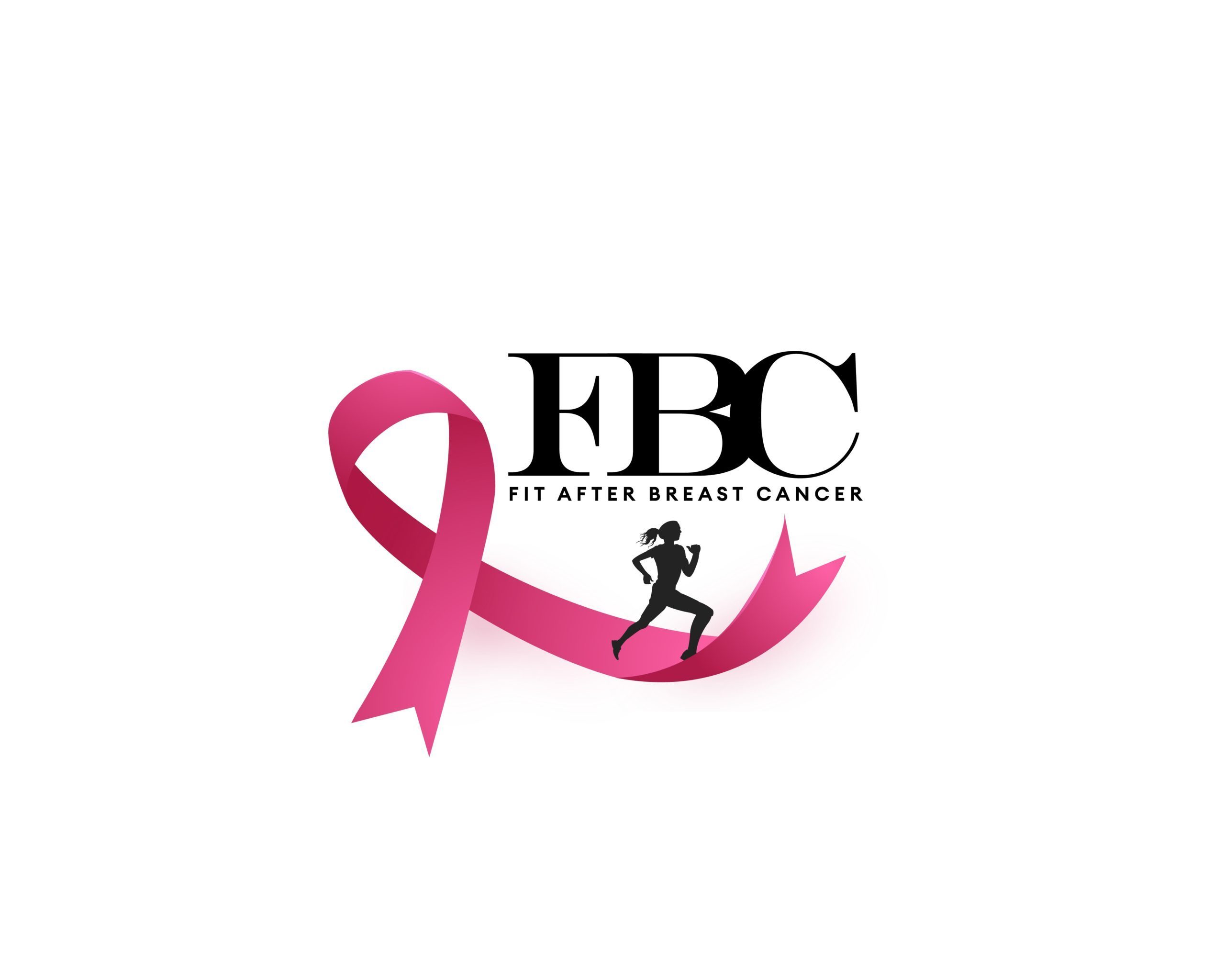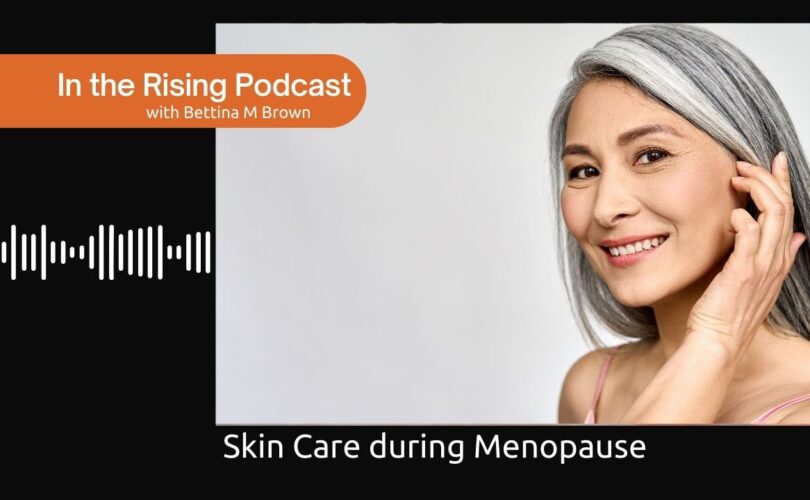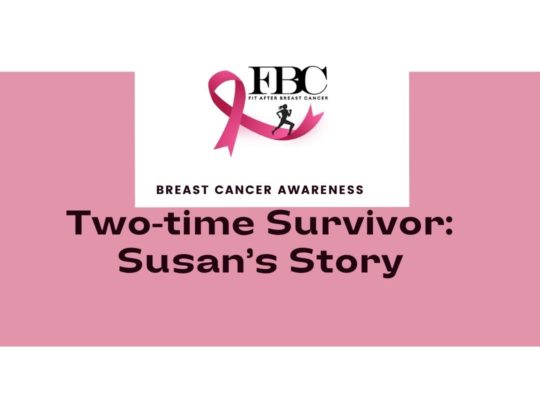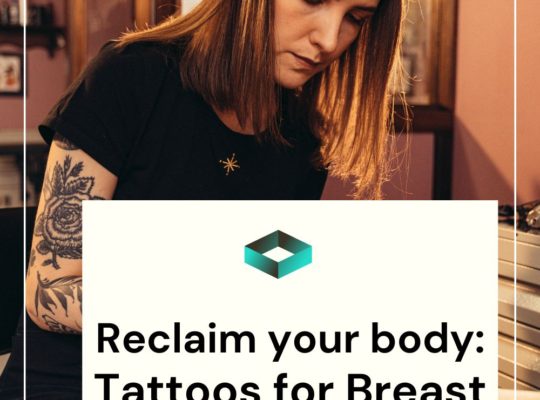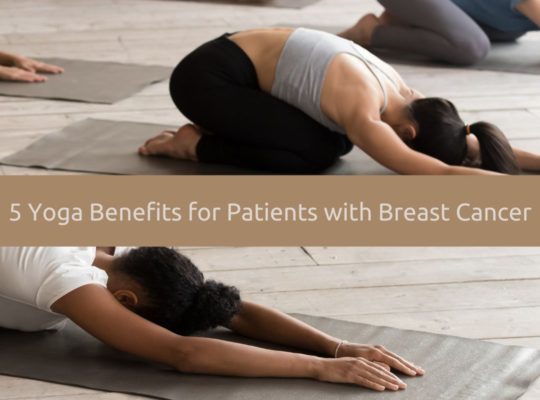Menopause. A topic that women often don’t talk about. Per Psychology Today, over 1.3 million women in the United States enter into menopause every year. The average age of a woman going through this phase of life is 51. All women will eventually go through this, yet it isn’t spoken about often. Nearly half of all women have never talked openly about it with their doctor or their friends.
The lack of discussion is surprising as menopause is so much more than the ending of a woman’s childbearing years. The hormone changes during this time affect a woman physically in their cardiovascular system and urogenital area, as well as having psychological effects. Since women live longer, with nearly one-third of their life being post-menopause, knowing more about having a high quality of life is essential.
In a recent episode of the Rising Podcast, we were honored to have an insightful conversation with Helen Marray-Finlay, a renowned makeup artist in Hollywood. Helen has worked in the industry for many years on projects such as Pirates of the Caribbean. In addition to this project, she has been the Department Head Makeup Artist for ABC, HBO, Netflix, and Disney. Makeup artists are creative with the skin as the canvas, making them skincare experts.
Helen’s challenge is to ensure everyone’s skin looks fabulous on camera for every shot. She shares her experience and the challenges of menopause and post-menopause firsthand. Helen aims to raise awareness and offer guidance for women who are dealing with menopause and offer advice for women who are dealing with menopause. As women may enter early menopause due to their cancer treatment, this is an episode topic that has a broader reach.
Helen’s passion for this topic started when she required a hysterectomy at a young age. She shared that she was unaware that despite keeping her ovaries, she would face various menopausal symptoms. She initially thought they were specific to her situation. Throughout her journey, Helen faced confusion and fear due to the lack of information on menopause/ post-menopause and the changes occurring within her body. Her symptoms ranged from hair loss and chronic insomnia to mood swings.
After seeking help from several doctors, Helen finally found an empathetic surgeon who understood her condition and shed light on her experiences. The physician explained how and why the symptoms Helen was experiencing were linked to menopause. With the support of well-informed medical professionals, she started rebuilding control over her life. This realization ignited her passion to become an advocate for other women experiencing similar struggles.
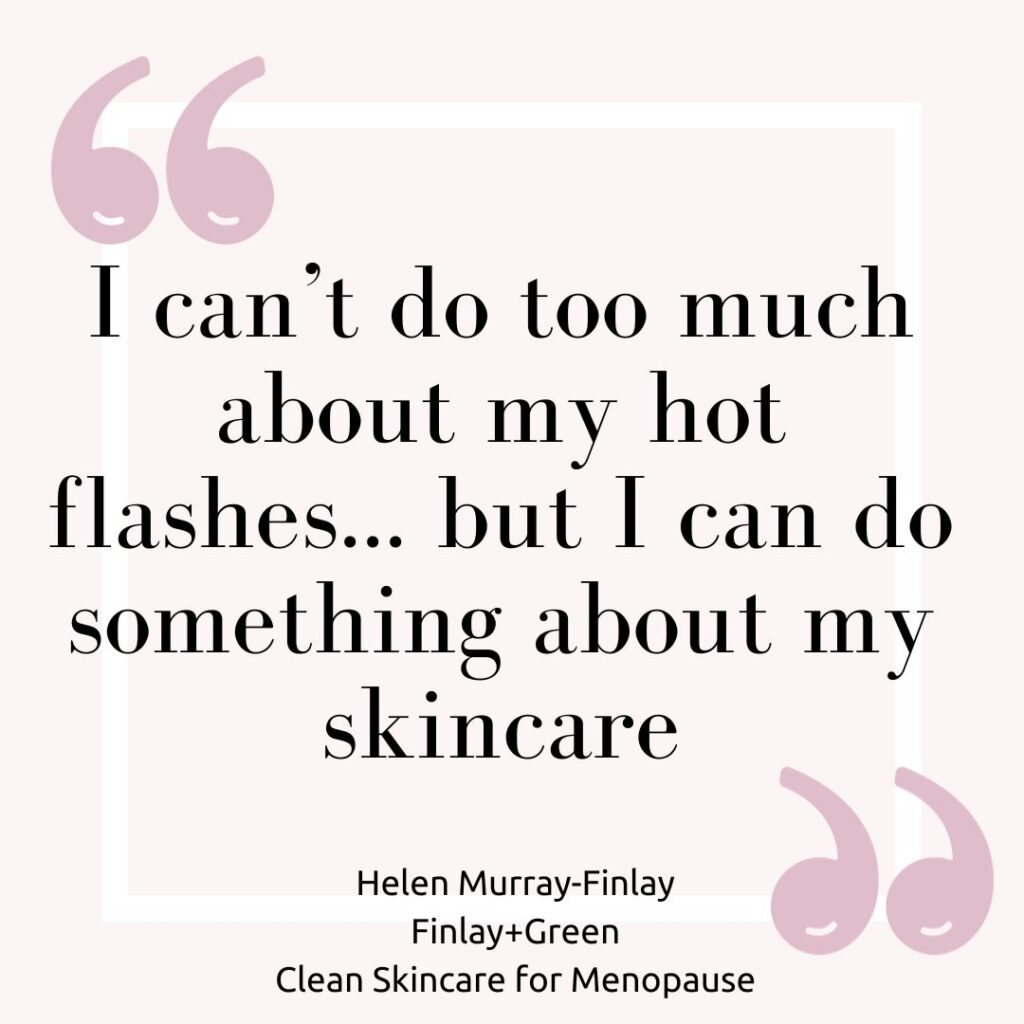
What are the skin changes during menopause/perimenopause?
Skin health is important to have that look of glowing skin. Though this may sound like a vanity metric, human skin is an excellent barometer of a person’s overall health. Skin changes during menopause require awareness and a new routine to increase skin elasticity and ensure that the skin quality remains intact.
Even though there are many websites with expert tips on treating your skin during menopause, the reality is that the ability to improve skin and prevent new spots from forming is to start before menopause- in perimenopause. For most women, this begins in mid-30s.
Skin Changes During Menopause
Several symptoms occur during menopause- forgetfulness, “brain fog,” skin changes, weight gain, hot flashes, and sleep problems.
Every aspect of life is affected by the changes that naturally occur during a woman’s life span with the decrease in estrogen. Since the skin has estrogen receptors, one of the pronounced changes, not only to the woman but to others, is the change in the skin. The skin is often ignored as being one of the organs of the body and can be a window of health. The skin is so much more than just a collection of dead skin cells.
With the hormonal changes, the skin begins to experience a loss of collagen, which is part of the skin scaffolding. A woman’s skin loses about 30 percent of its collagen within the first few years. This leads to drier skin and increases skin irritation, giving the appearance of being unhealthy. Not only is the skin different in appearance, but it is also different in its function. Fewer glycosaminoglycans present create less water content, leading to less skin turgor. For some women, they will notice a sharp increase in the number of fine lines and wrinkles as well as sagging skin. Where the skin would “bounce back” after being stretched, returning to its prior state is slower. This cascade creates wrinkles- associated with increasing skin age.
Though acne is often associated with those going through puberty or those going through high levels of stress- it is also a skin condition for women going through menopause. Hormones have a substantial effect, as do other lifestyle challenges. Having trouble sleeping, needing help maintaining a healthy eating routine, or connecting with wellness tips makes it more challenging to support a healthy body weight.
Hirsutism- when women have dark and coarse-like hair growing in areas that are commonly associated with a male hair growth pattern (chin hair, anyone?) is another condition that our hormones can create for menopausal women.
Acne during menopause may have some other health indicators behind the breakouts. Seeing your healthcare provider can help determine if other factors may be creating hormone changes, such as obesity and high cholesterol. Medications may be available, and if acne persists without change, it would be beneficial to see your healthcare provider.
The Skin Changes are:
- Acne
- Dry skin
- Itchy skin
- Dull skin
- Decreased collagen in your skin
- Skin redness
- Appearance of wrinkles
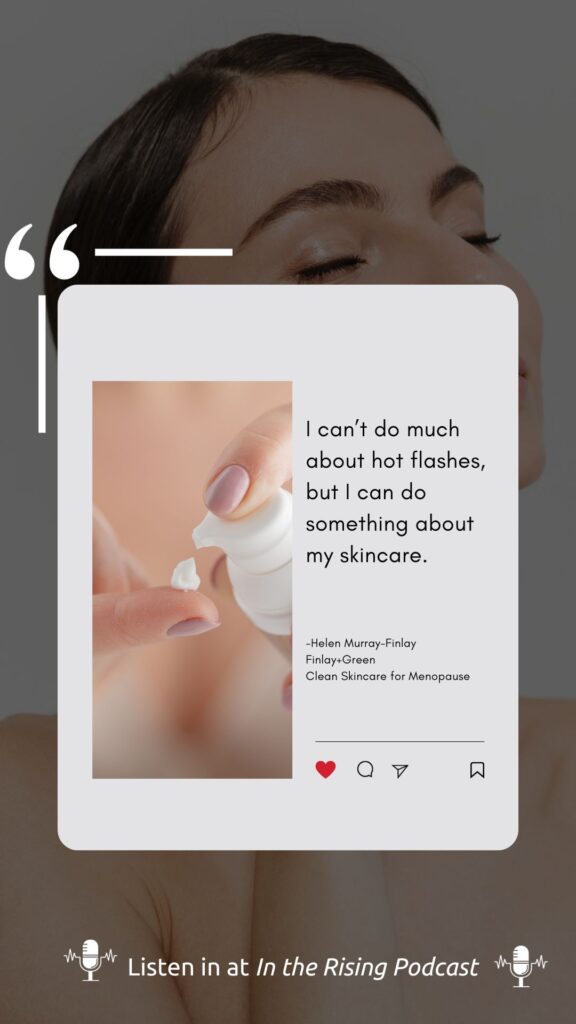
Skin care tips to help care for your skin during menopause:
1. Moisturize regularly: The drop in estrogen during menopause can lead to dry, itchy, and flaky skin. A good quality moisturizer can help keep the skin hydrated and supple.
2. Use a gentle cleanser: As the skin becomes more sensitive during menopause, it’s essential to use a mild cleanser that does not strip the skin of its natural oils.
3. Protect from the sun: The decrease in estrogen can also lead to a decline in the skin’s ability to protect itself from the sun’s harmful rays. A broad-spectrum sunscreen with a high SPF is helpful to protect the skin from sun damage.
4. Eat a balanced diet: A healthy diet rich in fruits, vegetables, and lean proteins can help support the skin’s health during menopause.
5. Stay hydrated: Drinking plenty of water can help to keep the skin hydrated and prevent dryness.
6. Consider hormone replacement therapy: Some women may benefit from hormone replacement therapy to help improve the health and appearance of their skin during menopause.
7. Consult a dermatologist: If you have specific skin concerns during menopause, it’s important to consult a dermatologist who can provide personalized recommendations and treatments.
Cosmeceuticals for Estrogen-Deficient Skin
The decline in estrogen hormone levels, whether due to natural aging processes, surgical interventions, or medical treatments, has profound effects on the skin’s physiology and appearance. Estrogen is pivotal in maintaining skin hydration, elasticity, thickness, and overall health. Consequently, estrogen-deficient skin exhibits increased dryness, reduced collagen production, diminished elasticity, and heightened susceptibility to wrinkles and sagging. In this context, cosmeceuticals emerge as a potent ally in addressing the unique challenges associated with estrogen-deficient skin.
Understanding Cosmeceuticals
Cosmeceuticals represent a fusion of cosmetics and pharmaceuticals, offering products with bioactive ingredients that provide therapeutic benefits beyond mere aesthetic enhancement. Unlike conventional cosmetics, cosmeceuticals contain active compounds with scientifically proven efficacy in enhancing skin health, combating aging, and addressing specific dermatological concerns. These formulations penetrate deeper layers of the skin, targeting cellular processes, promoting regeneration, and optimizing skin function.
Addressing Dryness and Hydration
Estrogen-deficient skin often manifests pronounced dryness due to reduced sebum production and impaired moisture retention mechanisms. Hyaluronic acid, a prominent ingredient in cosmeceuticals, emerges as a game-changer in combating this issue. Hyaluronic acid attracts and retains moisture, plumping the skin, enhancing elasticity, and diminishing the appearance of fine lines and wrinkles; it is known for its exceptional water-binding capacity. Incorporating hyaluronic acid-rich serums or moisturizers revitalizes estrogen-deficient skin, restoring its natural moisture balance and suppleness.
Stimulating Collagen Production
Collagen, a structural protein abundant in youthful skin, imparts firmness, elasticity, and resilience. Estrogen fosters collagen synthesis, and its decline reduces collagen production, contributing to sagging, wrinkles, and loss of skin density. Cosmeceuticals enriched with collagen-boosting ingredients such as peptides, retinoids, and growth factors stimulate fibroblast activity, promoting collagen synthesis and rejuvenating estrogen-deficient skin. Regularly applying these formulations enhances skin firmness, reduces sagging, and restores a youthful contour.
Antioxidant Protection and Repair
Estrogen-deficient skin becomes more susceptible to oxidative stress, free radical damage, and accelerated aging. Antioxidants, pivotal cosmeceutical components, neutralize free radicals, mitigate oxidative damage, and fortify the skin’s natural defense mechanisms. Vitamins C and E, green tea extract, resveratrol, and coenzyme Q10 emerge as potent antioxidants, safeguarding estrogen-deficient skin, enhancing repair processes, and preserving its youthful vibrancy. Incorporating antioxidant-rich cosmeceuticals combats aging and improves skin clarity, brightness, and overall radiance.
Addressing Hyperpigmentation and Uneven Tone
Estrogen plays a role in regulating melanin production, and its deficiency can lead to hyperpigmentation, uneven skin tone, and the appearance of age spots. Cosmeceuticals containing hydroquinone, kojic acid, azelaic acid, and licorice root extract target hyperpigmentation, inhibit melanin synthesis and promote a more uniform complexion. Regularly using these formulations diminishes dark spots, evens skin tone, and restores a youthful, luminous glow to estrogen-deficient skin.
Cosmeceuticals represent a revolutionary approach to skincare, offering targeted solutions to address the unique challenges associated with estrogen-deficient skin. By harnessing the power of active ingredients such as hyaluronic acid, collagen-boosting compounds, potent antioxidants, and pigment-regulating agents, cosmeceuticals rejuvenate, nourish, and restore vitality to estrogen-deficient skin. Embracing a tailored regimen incorporating scientifically formulated cosmeceuticals empowers individuals to defy the signs of hormonal imbalance, embrace their skin’s natural beauty, and navigate the journey of aging with grace, confidence, and radiant skin.
Skin Care Regimen for Mature Skin
What is a critical process to make the skin look brighter with the changes to your skin?
Hydration is key. Menopausal skin tends to be drier due to decreased oil production and moisture retention. Incorporate a hydrating serum enriched with hyaluronic acid, glycerin, or ceramides. These ingredients attract and retain moisture, plumping the skin and reducing the appearance of fine lines and wrinkles. Moisturizers formulated with emollients like shea butter, jojoba oil, or squalane nourish and hydrate the skin, restoring its suppleness and elasticity. Hydration is essential in skin care, especially for skin without as much estrogen.
By sharing her story on platforms like In the Rising Podcast, Helen hopes to provide resources and understanding for women facing similar life obstacles. Her inspiring journey highlights the need for not only education on menopause but also empathy towards those who are navigating through this stage along with additional challenges such as cancer. Together, we can help break stigmas and offer support for women during their most vulnerable times through open conversations like this one.
Nourishment from Within
A holistic approach to skincare involves nourishing the skin from within. Maintain a balanced diet of antioxidants, vitamins, minerals, and essential fatty acids to support skin health and vitality. Stay hydrated by drinking plenty of water throughout the day, and consider incorporating omega-3 fatty acids in fatty fish, flaxseeds, and walnuts to bolster skin hydration and reduce inflammation.
Are you interested in watching the video or listening to the podcast?
Interested in similar podcasts? Check out-
1. Beyond the Menopause Horizon with Health and Nutrition Coach Kirstie Wilson
2. The Power of Vibrance: How Dr. Yug Varma is Unlocking the Potential of Skin Care
3. The Power of Hormone Intelligence: Empowering Women’s Health with Dr. Aviva Romm
Below is the transcript, in case you opt to read the conversation! Subscribe to the In the Rising Podcast and do not miss any episodes!
Bettina M Brown
Hello and welcome to In the Rising, a health and wellness podcast for those going through and supporting those going through cancer. My name is Bettina Brown, and I’m board-certified in physical therapy, wound care, and lymphedema. And you know, for me cancer is very personal. It’s affected my friends, my immediate and my not-so-immediate family, and therefore I created this podcast and FitafterBreastCancer.com to address the multiple dimensions of our lives during and after recovery. Hello, hello, I am so excited to talk to you today. I had a guest that is really just phenomenal. She really is raw, but she talks about something that we often don’t talk about. And for many, many women who are going through any type of cancer, particularly breast cancer, they are going through it in a time of their life that’s in the middle of menopause or post-menopause, so it isn’t just the cancer that they’re dealing with. And my guest today, Helen Marray- Finlay, is a phenomenal person because she knows all about skin, deals with skin all day, every day, but also shares her own vulnerable story about why she feels menopause is so important. And if you wait till the end of the podcast, there’s a special gift for you. Welcome, Helen, to the Rising Podcast. I am excited to have a conversation with you today. Me too. Me too, you love to talk about menopause, and I looked it’s on your website, but it is October 18th is World Menopause Day. You and I are having a chat on October 16th and I wanted to ask you this question what drew you to menopause? Why does this mean something to you?
Helen Marray-Finlay: 2:03
It was all came about because I had a hysterectomy and it was young COVID but I kept my ovaries, so I was under the impression that I wasn’t going to go into menopause. But, in fact, I did go into menopause. So it’s a very personal story for me. It’s my own personal journey. And then once I realized that the symptoms I was showing exhibiting, I realized they weren’t unique to me. That’s when I felt women need to know about this more and I kind of felt that I wanted to be a part of that voice really. So that’s where it all started.
Bettina M Brown: 2:38
And thank you. Thank you for sharing such a personal event. It does sound like you were not fully aware of what was coming for you after this hysterectomy. Is that a fair assessment?
Helen Marray-Finlay: 2:51
Oh, absolutely I was not expecting it. In fact I didn’t really realize I was even in perimenopause in the lead up, because that hadn’t really been spoken about either. So I was blindsided.
Bettina M Brown: 3:05
Did you feel any frustration with not having heard about perimenopause, menopause, or postmenopause? Or just tell me a little bit about your emotions involving all of this.
Helen Marray-Finlay: 3:17
I did. I wished I’d known about it and I wished I had known that there were resources out there at the time. But I think I felt you know there’s a lot of the symptoms I didn’t know what was causing them. So it was quite a frightening time really. I was losing a lot of hair, I had chronic insomnia, feeling kind of blue, to be honest, I think because of lack of sleep, and I think if I had known that was menopause at the time, I would have given me back some control, because I would then have put a label on it and I would have known at least I would know where to start. Right, I would have tried to find a doctor from there. But yeah, without knowing any that they’re all connected, I was kind of stumbling in the dark really, to be honest.
Bettina M Brown: 3:59
So you learned, obviously, that you were experiencing the symptoms, say, you put a label on it. What were the steps that you took, Helen, to start to take control back over your life?
Helen Marray-Finlay: 4:13
It was just research, you know. It was just. You know. Why was that? Did I have insomnia and why was my skin so dry and my hair? And I started to see that maybe there was a you know, an estrogen link to all of that. But to be honest, it really started with after hysterectomy. I went back to my doctor, I told him all the symptoms I had and even he never made the connection which is kind of strange because I had hysterectomy, you know. But again he said oh, you kept your ovaries, so I had to go to see probably three doctors. It wasn’t until I actually had a follow-up with my surgeon and I just I told her all these symptoms and she looked at me Helen, you’re a menopause and that was the aha moment and she was lovely, I think. From then on things got so much better. But it was having someone that was empathetic and was willing to listen to those symptoms and take me seriously.
Bettina M Brown: 5:08
That was the big change really being taken seriously and what you just mentioned going to multiple Doctors and then being taken seriously. That’s a frequent journey for so many.- Having to go to doctor after doctor like no, no, you’re fine, it’s all in your head, and then not being really taken seriously and not being seen and not being heard.
Helen Marray-Finlay: 5:35
No, it’s extremely Australian. You probably know these stats, but when I started looking so I was so surprised when my doctors had never made that link. And then I did some research on that and it found that 80% of doctors are on comfortable talking menopause and Only 20% of OBGYNs even study menopause. So that’s when I saw there was a real Information gap that if our own healthcare providers were not equipped, it’s not surprising that when we go to the doctor they lacked empathy or understanding or could kind of put us on the right track to a certain, you know, maybe medications or treatments that we could, we could maybe follow. So that was another reason I became even more passionate about that was, you know, almost women have to take control of the education side of things too. We have to educate ourselves.
Bettina M Brown: 6:26
And really what you said. You did the research. I mean, all of us should be involved in our own health care, but it does sound like you had to start from scratch.
Helen Marray-Finlay: 6:34
Yeah, I mean I didn’t know. Well, you know I don’t have osteoporosis, but I didn’t know that there were so many other symptoms connected to menopause, such as Osteoporosis, you know, cardiovascular diseases, which is actually the theme of this year’s menopause awareness day or month. In fact, there’s so many, you know. You know your sexual health changes to. You know sex can be more painful. You have less of a sex drive. There’s so many different things that I don’t think that women may be going through at this age that they they’re not linking back to menopause. Obviously, menopause is not going to be they the reason for everything you’re suffering, but it could be, you know. So it’s well worth getting things checked out right and setting your mind at rest, but it is amazing that menopause is linked to so many different symptoms.
Bettina M Brown: 7:21
It’s linked to a lot, and one of them is even feeling, you know, like not all the way there mentally a little bit of a fog. And now you also mentioned, as you were sharing all of this, you felt like there was dry skin and your hair loss, but it also sparked up something because of your career. Share a little bit about what you do. What’s your day job?
Helen Marray-Finlay: 7:44
Well, my day job. I’m a makeup artist in Hollywood, so I work on big TV shows and movies like Pirates of the Caribbean and TV shows like Barry, the Goldbergs, Brooklyn, 9, 9. So I’ve worked with lots of people, lots of women, lots of women of all different ages, all different skin types and I think you know, since I’ve become much more aware of menopause I’ve been talking a little bit about it at work more, and it’s amazing how open Women are now are about talking menopause. Suddenly, if someone starts a conversation, they’ll add their two cents worth and it’s really good, you know, kind of diving off them and and finding out what they’re doing and that might help them, which may then help you. So it’s exciting that that conversation is getting broader and that’s amazing.
Bettina M Brown: 8:29
That’s amazing now in the hindsight, we’re gonna talk a little bit more about that. But now that you’ve been through this experience and you said you work with women of all ages, do you feel like now there’s a few more clicks together with the foundation, the basis of, like, the skin that you’re working with of the different age women and where they are in those four phases of menopause?
Helen Marray-Finlay: 8:52
Oh, you mean, if I can see those differences, well, the big difference is hydration. It’s the inability to lock in that moisture that you really start to see when someone’s in perimenopause. So the dry skin. As soon as you enter menopause your skin changes quite rapidly. In the first few months your skin is going to be a lot less elastic. So you definitely, from perimenopause, you start seeing that. I would say I start to see that probably when someone’s around about 47. That’s when I really start to see that difference in their skin, for sure, without a doubt. And then hyperpigmentation too, when women are getting around about late 40s, 50s. That skin damage we had in our early 20s, when we weren’t so great back then and put in the SPF on, that’s going to come back to haunt you at this point of your life. You’re going to see a lot more hyperpigmentation in those areas that you probably had sunburn. So those are the other big key signals really.
Bettina M Brown: 9:54
And now you decided to do a little bit about some of this, so share a little bit about your website and what you’ve decided to delve into.
Helen Marray-Finlay: 10:03
Because I was on this journey, I didn’t know what was happening. Then I figured out what was happening. A big part of it was just taking back control and I realized that I can’t do too much about the hot flashes and things like that. But I could do something about my skincare. I had found that my usual go-to is my favorites didn’t work anymore. There was just something missing. There’s still great products where there was something missing now and it just wasn’t working on my skin. So I figured that that was one area that I could address, and so I started developing a skincare line that is specifically tailored for menopause. We have ingredients that are going to counter a lot of those symptoms that you’ll exhibit during menopause. Like I said, the sagging skin, lack of firmness, hyperpigmentation. Someone would get hormonal acne. So I wanted to make sure there was nothing. There were blocked pores, but definitely protecting the skin barrier, strengthening that so you can lock in that hydration. That was really important to me because if I felt good in my skin, I felt good about stepping outside and going on with my life. Everything else felt that it was crumbling, the brain fog and that, but at least I felt good in my own skin.
Bettina M Brown: 11:16
And there’s like what you just said you feel different if your skin’s good. But there’s a lot of research that says if your skin is, or you present outwardly well, it does affect your confidence. It does affect your day-to-day life. And if you feel confident to go out and exercise and if you feel confident to go to the store and go drink a little, you just move different, you own your space different, and so it is not just the skincare, it has so many other layers that, emotionally, are important as well, especially when you feel like things are out of control or you work in Hollywood. I know we’re not all Betty whites, but there’s a time when you’re in your prime and there’s a time when you’re not. I think how you present is super important.
Helen Marray-Finlay: 12:02
And, I think, the time of your life where I think anything goes, if you want to wear the big black heavy eye line and go for it, or if you want to be more natural and just have a nice moisturized run and some sunscreen. I don’t know. I don’t know if you saw Pamela Anderson this past couple of weeks. Gosh, I think she’s just a rock star. I think that’s fantastic what she’s doing. She looks beautiful. Like she said, it’s just all about feeling good about yourself. She’s doing it for herself now, which I think is great.
Bettina M Brown: 12:34
And that is ultimately what it is all for. Like what you said, the big dark eyeliner or the nothing. It really is about yourself and feeling good about yourself. Some people may be listening like, oh yeah, another skincare line. What were you looking for specifically for your products to work? Are there many different ones, or is there one where it’s really looking at hydration or anything like that?
Helen Marray-Finlay: 13:01
Well, our moisturizer, it’s all about hydration. When you’re going through menopause, your ester levels decline, but so do your collagen levels decline. Your collagen drops by 30% and then it will drop 2% every year thereafter and your skin is much more sensitive. It’s a skincare line that, as I said, is really developed specifically for those issues that menopause brings on, so it’s not a typical anti-aging make skincare line. It’s definitely more niche in that sense. So it’s for you in this stage of your life. So we have things like hyaluronic acid, which is a great hydrator and a great buzz ingredient, and that’s fantastic. But we have other great hydrators in there too, like squalene, which is fantastic. But it’s all about protecting the barrier your skin barrier so you can lock in that hydration. So whatever product you put on your skin, it’s going to absorb and it’s going to lock it in. So, your pH level changes, so your skin is a lot more sensitive. So we’ve taken that into account. A lot of creams and a lot of ingredients. As you’re getting older and going through menopause, you want to stay away from, for example, retinol, which is a great ingredient, but during menopause it’s not such a hot ingredient, because if your skin is already sensitive, adding an ingredient like that is not good. During menopause, you really do need to take care of your skin in probably a different way, as you did a few years ago.
Bettina M Brown: 14:34
And it sounds like that’s a good piece of your life to really focus on repairing what was done in earlier phases but also addressing the now, because you’re so focused on menopause. What do you feel like has been a lesson or a gift that you’ve learned through this whole process?
Helen Marray-Finlay: 14:55
I think I’ve been really surprised when I started talking about menopause amongst friends and colleagues and that how open women now are talking about it and I think that’s been a real blessing and it’s been a real source of comfort. It helps create that network of people around you. So I do encourage people to talk about menopause. You know I may sound like a broken record half the time to my friends now, but I do encourage people to talk about it. You’ll be quite surprised.
Bettina M Brown: 15:27
Well, thank you so much. I’d like you just to share your website. I will have that in the description as well, okay.
Helen Marray-Finlay: 15:34
I’m going to go to https://finlayandgreen.com, and Finlay is my name, and green because we hope to be as green as we possibly can.
Bettina M Brown: 15:49
Love the skin that you’re in. How many times have we heard that and really wanted to connect with that statement, but felt, that because of hyperpigmentation, because the skin is dry, because we want to peel the skin right off, or we’re so frustrated with what we’re looking at in the mirror that we don’t love the skin that we’re in. And for many women going through menopause, this is exactly the scenario that they’re feeling, and so Helen realized this, because she sees it all day as her has her work as a makeup artist. But she herself has been through it, and I tend to lean to people who’ve been through a thing or two, even though we all share our own extraordinary journey and so she is giving all of us listeners a 30% discount, and I will put that in the link below that if you like to try something out to see if it works for you, give it a shot. You have nothing to lose. Thank you so much for giving me your time today and for listening in. If you feel this podcast is something that will help others, go ahead and share it. It will make such a difference if we put it in the hands and ears of those that will make a difference for today. Go ahead and leave it a five-star review. It does so much again to spread the word and I look forward to talking to you and hearing from you in the future. And until next time, let’s keep building one another up!
